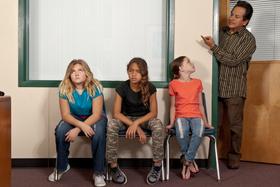Social media has become a prevalent component of today’s society, shaping relationships on both a professional and personal level. Unfortunately, the advent of social websites did not come equipped with a handbook to guide users with ethical boundaries in the use of these media outlets. Instead, this job has been a reactive one, left to whoever might see potentially offensive posts and take the necessary steps to discipline those responsible. In the case of students, that job is often taken on by the public school system – much to the chagrin of many who believe the line between public school and private life must remain strong and consistent.
This video from PBS looks at the issue of schools and social media.
According to a recent article at Eurasia Review, the age of the Internet is forcing many to reexamine constitutional liberties – primarily those protected under the First Amendment. Public schools have been flung directly into the fray, as they attempt to make the distinction between a student’s private life and the impact of the choices they make outside of school on the school environment overall. Currently, a number of questions have arisen over the use of social media by both students and teachers. Three cases, in particular, have forced public school officials, and even the court system, to take a second look at what constitutes “appropriate” behavior on social websites.
School Says No to Racy Photos, but Court Says Yes
The first case involves a group of teenage girls in Indiana who wanted to post photos of a slumber party on a Facebook page. The girls engaged in what some might consider inappropriate and others might write-off as simple teenage antics. According to a report at Internet Evolution, they donned lacy lingerie, pretended to kiss one another, and posed for sexually-suggestive photos. The pictures were then posted on the Facebook pages of two of the girls, who wanted to show their other friends what they did that evening.
The pictures were not only viewed by the girls’ friends, however. A mother of another female student at the school saw the pictures and notified the school. This parent claimed that the photos would cause divisiveness between girls on the school volleyball team. Two of the girls at the slumber party played on the volleyball team, although the daughter of the parent who made the complaint was not.
The school reacted to the complaint and the photos by banning the girls involved in the volleyball team and other extracurricular activities. The school claimed the photos violated the school code, which prohibits displays that “discredit or dishonor…yourself or your school.” The case was taken to court, and a federal judge in Indiana ruled that the school violated the students’ First Amendment rights by disciplining them for activities that took place off of school property – in the privacy of a home.
Teachers’ Comments Result in Suspension
In another Facebook case in Florida, a teacher who has formerly voted Mount Dora High School’s Teacher of the Year was suspended from his post for comments he posted on his Facebook page. According to a report at the Orlando Sentinel, Jerry Buell used his personal Facebook page to condemn same-sex marriage, stating that gay marriages were part of a “cesspool.” He also called the unions a sin and said, “God will not be mocked.”
This video describes teacher social media no-nos.
Buell was suspended from the classroom and reassigned for his comments. An investigation into the matter is ongoing by the Lake County School Board. Buell told the Sentinel his comments were not hateful, but simply how he interpreted things. However, those who saw Buell’s comments on Facebook asserted that they could make gay students feel uncomfortable in Buell’s classroom. Until the investigation is complete, Buell has been assigned to an administrative position within the district.
Teachers and Students: No Online “Friendships”
In Missouri, an online relationship between a teacher and student has resulted in the signing of the Amy Hestir Student Protection Act by Governor Jay Nixon. Amy Hestir was a junior high school student who was lured into an abusive sexual relationship with a music teacher that lasted more than a year. The purpose of the act is to protect other children from similar situations by limiting the type of contact allowed between students and teachers outside the classroom. Included in this act are some types of teacher-student contact through social media.
Despite the good intentions of the act, there are some (teachers included), who are not comfortable with the scope of the restrictions. According to a report at the Christian Science Monitor, Christina Thomas, a teacher in the Ladue School District claimed the rule could keep her from communicating with her own child on Facebook. The Missouri Teachers Association filed a complaint against the act shortly after it was signed, proclaiming it to be “deeply unfair.”
This video looks at how students and teachers should interact on social media.
However, school officials and lawmakers who supported the act point out that Amy Hestir is not the only student to be enticed into an inappropriate relationship with a teacher. In another Missouri case, teacher Amy Jackson was arrested after having an affair with a student that was reportedly initiated on Facebook. A substitute teacher in New Jersey was also arrested after impersonating a student on Facebook and participating in explicit conversations with other students on the website.
The advent of social media has complicated the face of student rights and protections for public school districts across the country. State legislatures and school officials are sure to be hashing out these issues for some time to come.
Questions? Contact us on @publicschoolreview















